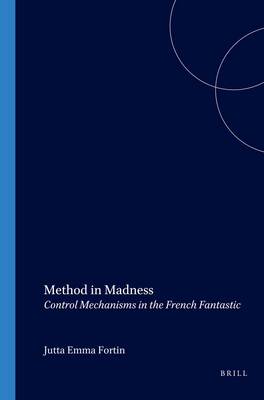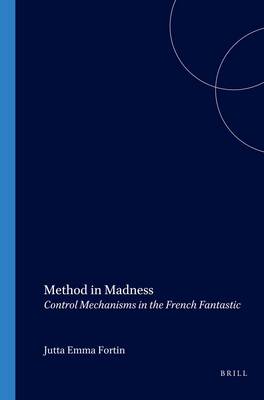
- Afhalen na 1 uur in een winkel met voorraad
- Gratis thuislevering in België vanaf € 30
- Ruim aanbod met 7 miljoen producten
- Afhalen na 1 uur in een winkel met voorraad
- Gratis thuislevering in België vanaf € 30
- Ruim aanbod met 7 miljoen producten
Zoeken
Omschrijving
Method in Madness looks at the ways in which nineteenth-century French literature of the fantastic reflected what psychoanalysis would later define as mechanisms of defence. Each chapter of the book is dedicated to a particular mechanism - fetishization, projection, intellectualization, mechanization, and compulsion - and to a representative set of texts which illustrate and embody the process concerned. The book thus systematizes what has remained up to now a rather vague perception of the psychological processes at work in fantastic narrative and of the relationship between the fantastic and the emerging science of psychoanalysis. Although centred on French works, including texts by Gautier, Mérimée, Balzac, George Sand, Maupassant, and Villiers de l'Isle-Adam, the study necessarily deals with the German tradition of the fantastic, notably Hoffmann and Freud. It argues that mechanisms of defence not only take place in fantastic literature, but that the fantastic itself in fact consists in translating defence into the real, thus making clear to the reader the very processes by which defence occurs. The book finds that the defence mechanisms "fail" in the fantastic, because in this literature defence involves adding a real danger to a merely psychic one, thereby intensifying the anxiety and displeasure which the mechanisms of defence are ideally designed to minimize.
Specificaties
Betrokkenen
- Auteur(s):
- Uitgeverij:
Inhoud
- Aantal bladzijden:
- 148
- Taal:
- Engels
- Reeks:
- Reeksnummer:
- nr. 16
Eigenschappen
- Productcode (EAN):
- 9789042016569
- Verschijningsdatum:
- 1/01/2005
- Uitvoering:
- Paperback
- Formaat:
- Trade paperback (VS)
- Afmetingen:
- 150 mm x 220 mm
- Gewicht:
- 258 g

Alleen bij Standaard Boekhandel
+ 180 punten op je klantenkaart van Standaard Boekhandel
Beoordelingen
We publiceren alleen reviews die voldoen aan de voorwaarden voor reviews. Bekijk onze voorwaarden voor reviews.








